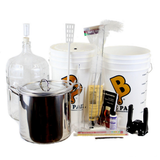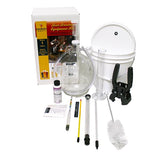Water Chemistry
A Very Basic Guide to Water Chemistry
Asheville Brewers Supply 828.285.0515
This guide applies to very soft water. We recommend using Reverse Osmosis water to build from. For advanced water calculations and/or additional water information, Brewer's Friend software is an excellent resource!
Gordon Strong recommends the following basic baseline (per 5 gallons of water treated):
For malty beers: Add 1 tsp. calcium chloride (CaCl2)
For hoppy beers: Add 1 tsp. gypsum (CaSO4)
For dark beers: Add 2 tsp. calcium carbonate (ONLY if mashing dark grains and not adding them at sparge)
If you are wanting to balance malt and hop characteristics, you may use a combination of CaCl2 and CaSO4.
AJ Delange recommends using acidulated malt and brewing salts for pH adjustment.
Baseline: Add 1 tsp of calcium chloride to each 5 gallons of water treated. Add 2% sauermalz to the grist. [NOTE: If using Lactic Acid (88%) instead of sauermalz, 1% sauermalz is equivalent to using .854mL Lactic/10 lbs. Adjust LA addition according to grain bill, for example in a 12# grain bill… 12/10= 1.2. 1.2X .854= 1.02mL. A 15# bill… 15/10= 1.5. 1.5X .854= 1.28mL. etc…]
Deviate from the baseline as follows:
For soft water beers (i.e Pils, Helles). Use half the baseline amount of calcium chloride and increase the sauermalz to 3%
For beers that use roast malt (Stout, Porter): Skip the sauermalz.
For British beers (Amber, ESB): Add 1 tsp gypsum as well as 1 tsp calcium chloride
For very minerally beers (Export, Burton ale, IPA): Double the calcium chloride and the gypsum.
To get the best beer possible, you should vary the amounts of the added salts noting carefully whether a change benefits or detriments your enjoyment of the beer. More sulfate will sharpen the perceived hops bitterness (extra gypsum may be added to the kettle for hoppy beers). Additional chloride will round, smooth and sweeten the beer. Add or decrease these in small amounts.
Those serious about getting the best possible results should buy a pH meter and check mash pH, increasing or decreasing the amount of sauermalz or acid to get pH around 5.3.
References:
http://www.homebrewtalk.com/f128/brewing-water-chemistry-primer-198460/
Brewing Better Beer by Gordon Strong. Brewers Publications. Pg. 148.


